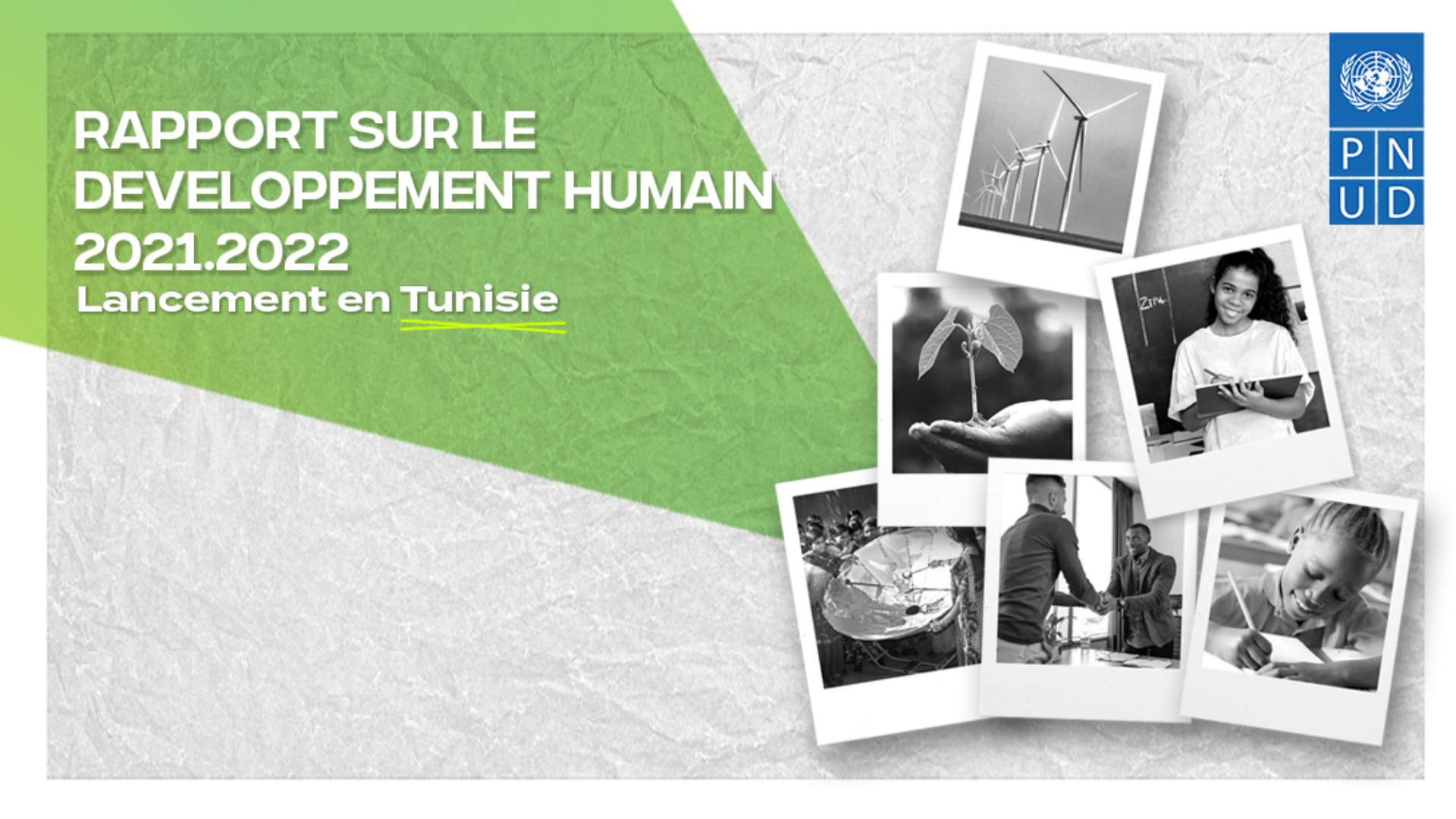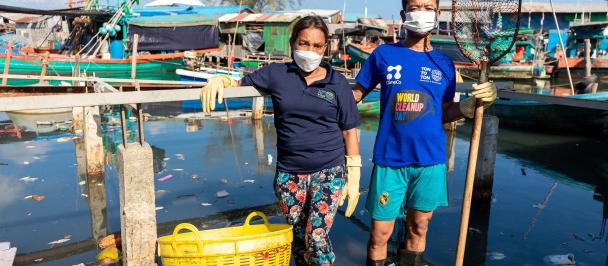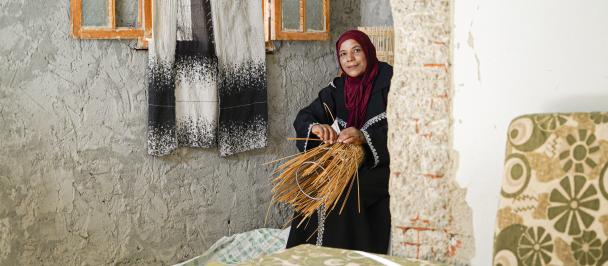By: Asma Bouraoui Khouja, Team Leader - UNDP Tunisia
Global upheavals, anxiety-provoking transitions and polarization: what does the new Human Development Report tell us?
28 novembre 2022

The United Nations Development Programme (UNDP) published its 2021-2022 Human Development Report (HDR)[1] in September on the theme: "Uncertain Times, Unsettled Lives: Shaping Our Future in a Transforming World”[2]. This report makes the unsurprising observation that the Human Development Index (HDI) in the world has declined for nearly 90% of the countries included in the ranking, while going back to its 2016 levels. In other words, all efforts to progress or even accelerate the achievement of the 2030 Agenda have been seriously compromised.
A suffering planet, widespread anxiety and structural inequalities still present!
The planet is suffering. So are people. The Covid-19 pandemic has plunged the world into a state of traumatic and post-traumatic stress, not only from a health perspective but also at the economic, social and environmental levels, exacerbating already existing vulnerabilities inequalities. The war in Ukraine has amplified these gaps, while being accompanied by a geopolitical disorder and an uncertain and indefinite transition to a new World order.
But was the world better off before Covid-19 and the war in Ukraine? The answer is clearly no. We have been living in a world of uncertainty and anxiety for over a decade. Inequality has, in some cases, motivated social movements and political upheaval. At the same time, extremism on all sides, demagogy and the rise of populism have also increased around the globe, contributing to increasing polarization, hate speech, and reducing trust in one another and in institutions , with social media as a contributing and facilitating factor. Less than 30% of people in the world believe that it is still possible to trust each other, a rate that is considered to be the lowest in recent years.
Why is the world in such a state? For some time now, we have been facing a new set of uncertainties that are mainly the result of global upheavals, whether climate-induced (e.g., fires and floods, depletion of natural resources, etc.), or linked to diseases and other epidemics or food insecurity. The Anthropocene, as highlighted in the HDR 2020, is the era in which humans, through their way of life, production and consumption, are undermining the entire planet and mortgaging their own future. The uncertainties arising from the Anthropocene are a source of generalized anxiety and traumatic episodes that can generate violence and psychological distress, especially for vulnerable populations who generally have few means to effectively combat such trends. According to the report, 1 in 8 people suffer from mental health disorders, a proportion that has increased by 10% compared to 10 years ago.
Furthermore, the transformations needed to face the consequences of the Anthropocene, whether they are linked to the energy transition, digital technology or modes of production and industrialization, are likely to generate resistance and increase the feeling of uncertainty and social fragmentation.Finally, political and social polarization, fuelled by misinformation carried by social media and new technologies, contributes to increasing feelings of insecurity and distress, and conflicts in all their forms.
This set of multidimensional uncertainties is likely to slow down or even hinder human development. It results in an increase in inequalities and "social deficits" which in turn, undermine any possibility of mitigating the negative impacts of these uncertainties on the world and the planet. This is a sort of vicious circle that must be broken if we are to get back on the path of development in general and human development in particular.
[2] The report was officially launched in Tunis on November 9, 2022.
Should we just should give up?
It is paradoxical to see how much we are aware of the dangers of the Anthropocene and how much we lack the determination to face these dangers. Certainly, transitions are underway to mitigate the negative effects on the environment, health and societies, but these transitions are themselves sources of conflict and stress, uncertainty and fragmentation.
Not giving up is a given, but how to get there? It is important to never lose sight of the fact that people must always be at the centre of all policies, actions, transitions and other changes for a better future. Human development must contribute to improving people's well-being, but it must also to give them the freedom and capacity to protect themselves against hazards and feel secure. In the global HDR 2021-2022, this would be achieved through three key elements: (1) investment for a better future, which implies not only investments that generate wealth and decent jobs, but also investments that would allow nations to prepare for future shocks, whether health-related, environmental or geopolitical; (2) insurance, to protect populations against the hazards of life, in particular through robust social protection systems that can protect the most vulnerable from future shocks; and (3) innovation for a better response to future shocks through more effective tools.
Where is Tunisia in this picture and how can we aspire to a better world?
Tunisia has not escaped the global regression in human development. It has lost three places in the world ranking to be ranked 97th out of 191. It is ranked 2nd in the MENA region, after Algeria, and nevertheless continues to be part of the group of countries with a high level of human development.
Although belonging to the group of countries with a high HDI, Tunisia remains exposed to the same uncertainties as elsewhere in the world. Over the last ten years, the economic transition has been extremely complex, marked by almost flat economic growth and a deterioration of the social situation: rising unemployment, persistent marginalization of regions and populations, informality and precariousness, and the rise of violent discourse (including on social networks) are all elements that have characterized the transition over the last ten years. Covid-19, and more recently the war in Ukraine, have added additional challenges, particularly in relation to food security, and exacerbated structural problems related to inequalities and vulnerabilities.
Tunisia is now engaged in a socioeconomic reform programme that would allow in the short and medium term a necessary macroeconomic stabilization, and the positioning of the economy on the path towards recovery. However, it is important to place this program in a global and long-term framework of human development. Beyond the logic of stabilization, which is essential to restore macroeconomic fundamentals, addressing the human development challenges that have emerged over the past ten years and that have been exacerbated by the pandemic and the war in Ukraine is necessary to ensure the sustainability of the positive effects that are expected from this recovery.
If we refer to the HDR's recommendations, investment, both public and private, should be the focus of all public policies in Tunisia. Investment is the guarantee of a resumption of economic growth and job creation; it must also involve sectors that can strengthen the resilience of populations. We have experienced the Covid-19 pandemic, which seems to be relatively under control, but we are not immune to future shocks. Investment in the preparedness and prevention of future shocks must also be made, not only to foster the resilience of economies and populations but also to avoid slowing down or even halting development.
Protecting people and insuring them against risks is more than ever a priority. Social protection is a key focus of Tunisia's reform programme. It is also an important tool in the fight against life's hazards, vulnerabilities and poverty, and a guarantee for strengthening people's resilience and giving them the means to access greater security and safety.
Finally, innovation must guide all strategic decisions, public policies and behaviours. It is not only understood in the technological sense, but also from an economic, cultural and societal perspective. When used wisely, it is a catalyst for progress.
A reform program is in its starting phase in Tunisia. It is important to place it within the framework of the 2030 Agenda and to ensure that the reforms are translated into concrete measures and actions with a high impact on human development. Establishing links at every stage, and analysing the impact on people and their development, are fundamental if we aspire to a better future.

 Locations
Locations


